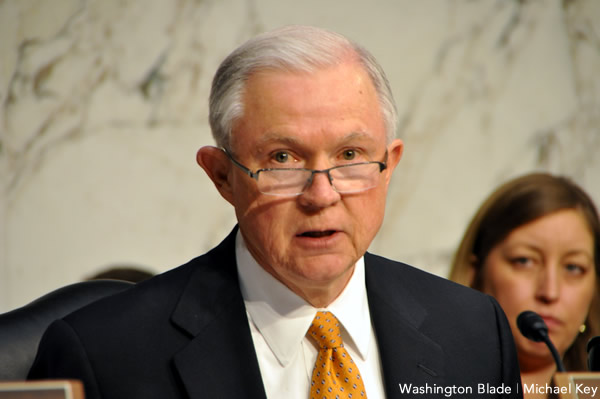National
Sessions to enforce hate crimes law ‘aggressively’ for trans murders
14 anti-trans killings have already taken place halfway through 2017


U.S. Attorney General Jeff Sessions (R-Ala.) has pledged to enforce the hate crimes law for transgender murders. (Washington Blade file photo by Michael Key)
U.S. Attorney General Jeff Sessions — criticized for his long anti-LGBT record — pledged Thursday to enforce the federal hate crimes law “aggressively and appropriately” in cases of ongoing transgender murders.
Sessions made the remarks at a hate crimes summit held at the Justice Department, saying the Trump administration is committed to reducing violent crimes and “hate crimes are violent crimes.”
“No person should have to fear being violently attacked because of who they are, what they believe, or how they worship,” Sessions said. “So I pledge to you: As long as I am attorney general, the Department of Justice will continue to protect the civil rights of all Americans — and we will not tolerate the targeting of any community in our country.”
Sessions ticked off a few Justice Department ongoing investigations under the Matthew Shepard & James Byrd Jr. Hate Crime Prevention Act – a measure he opposed as a U.S. senator before former President Obama signed it into law in 2009.
Commending the work of FBI and international partners, Sessions said a suspect was found and arrested in Israel for allegedly making threatening phone calls to Jewish community centers. The Justice Department, Sessions said, brought federal charges against him and continues an investigation into whether the acts are hate crimes.
In response to potential anti-Islamic hate crimes, Sessions recalled seeking an indictment of a Texas man who now faces 40 years in prison for burglary and arson of the Victoria Islamic Center; a man sentenced to more than 19 years in prison for trying to recruit people to help him burn down a mosque in New York State; and the indictment of Kansas man for shooting three men at a bar because he thought they were of Persian origin.
But Sessions also made a point to commit to enforcing hate crimes law when it comes to violence against transgender people, pointing to the first-ever prosecution of an anti-transgender hate crime under the Matthew Shepard & Hate Crimes Prevention Act, which recently resulted in a conviction under the law.
“We have and will continue to enforce hate crime laws aggressively and appropriately where transgendered individuals are victims,” Sessions said. “Last month, Joshua Brandon Vallum was sentenced to 49 years in prison for assaulting and murdering Mercedes Williamson. This is the first case prosecuted under the Hate Crimes Prevention Act involving the murder of a transgender person.”
Amid ongoing reports of transgender murders throughout the country, Sessions said he personally met with the department’s senior leadership and the Civil Rights Division on the issue. According to the Human Rights Campaign, those murders have reached a tally of 14 only halfway through 2017.
Sessions said he directed the Civil Rights Division to work with U.S. attorneys’ offices and the FBI to “support the state and local law enforcement authorities investigating these incidents and to determine whether federal action would be appropriate.”
Further, Sessions said he directed the review of files “to ensure that there is no single person or group behind these murders or to what extent hate crime motivation lies behind such murders.” Sessions said he receives regular updates on these reviews.
The attorney general’s remarks come after LGBT rights supporters sought to derail his nomination unsuccessfully based on his anti-LGBT record as a U.S. senator, which includes votes against the hate crimes law, “Don’t Ask, Don’t Tell” repeal and the Employment Non-Discrimination Act as well as support for a U.S. constitutional amendment banning same-sex marriage.
Upon confirmation as attorney general, Sessions revoked Obama-era guidance instructing schools to allow transgender students to use the bathroom consistent with their gender identity. Sessions said the law on which the guidance was based, Title IX of the Education Amendments of 1972, doesn’t make that a requirement — despite numerous court rulings that have determined otherwise.
Emily Waters, senior manager of national research and policy at the New York City Anti-Violence Project, said Sessions’ speech doesn’t make up for his other actions at the Justice Department.
“We won’t allow Jeff Sessions to use the violence perpetrated against LGBTQ people, and particularly the homicides of transgender women of color, to push forward a pro-policing agenda that does not acknowledge, recognize or protect LGBTQ people of color who are victims of police violence and brutality,” Waters said. “This is very clearly a tool to get more money for policing, and has nothing to do with actual hate crime prevention. If Jeff Sessions truly cares about LGBTQ people, then he would be diverting resources into the communities most impacted to address the real root causes of violence.”
On the same day Sessions delivered the remarks, the White House announced President Trump nominated Eric Dreiband, a former George W. Bush administration official, to head the Justice Department’s Civil Rights Division. Civil rights groups declared opposition to the nominee upon the announcement.
Vanita Gupta, who ran the division under the Obama administration and is now CEO of The Leadership Conference on Civil & Human Rights, said Dreiband is “woefully unqualified” for the job.
“Drieband has devoted the vast majority of his career to defending corporations accused of employment discrimination.” Gupta said. “He has opposed important legislation to safeguard our civil rights. And he has no known experience in most of the Civil Rights Division’s core issue areas, such as voting rights, police reform, housing, education, and hate crimes. He is the wrong person for the job.”
National
Supreme Court deals blow to trans student privacy protections
Under this ruling, parents are entitled to be informed about their children’s gender identity at school, regardless of state protections for student privacy.

The Supreme Court on Monday blocked a California policy that allowed teachers to withhold information about a student’s gender identity from their parents.
The policy had permitted California students to explore their gender identity at school without that information automatically being disclosed to their parents. Now, educators in the state will be required to inform parents about developments related to a student’s gender identity, depending on how the case proceeds in lower courts.
The case involves two sets of parents — identified in court filings as John and Jane Poe and John and Jane Doe — both of which say their daughters began identifying as boys at school without their knowledge, citing religious objections to gender transitioning.
The Poes say they only learned about their daughter’s gender dysphoria after she attempted suicide in eighth grade and was hospitalized. After treatment for the attempt and after being returned to school the following year, teachers continued using a male name and pronouns despite the parents’ objections, citing California law. The Poes have since placed their daughter in therapy and psychiatric care.
Similarly, the Does say their daughter has intermittently identified as a boy since fifth grade, but while their daughter was in seventh grade, they confronted school administrators over concerns that staff were using a male name and pronouns without informing them. The principal told them state law barred disclosure without the child’s consent.
Both sets of parents filed lawsuits in the U.S. District Court for the Southern District of California challenging the state policy that protects students’ gender identity and limits when schools can disclose that information to parents.
The justices voted along ideological lines, with the court’s six conservative members in the majority and the three liberal justices dissenting.
“We conclude that the parents who seek religious exemptions are likely to succeed on the merits of their Free Exercise Clause claim,” the court said in an unsigned order. “The parents who assert a free exercise claim have sincere religious beliefs about sex and gender, and they feel a religious obligation to raise their children in accordance with those beliefs. California’s policies violate those beliefs.”
In dissent, the three liberal justices argued that the case is still working its way through the lower courts and that there was no need for the high court to intervene at this stage. Justice Elena Kagan wrote, “If nothing else, this Court owes it to a sovereign State to avoid throwing over its policies in a slapdash way, if the Court can provide normal procedures. And throwing over a State’s policy is what the Court does today.”
Conservative Justices Samuel Alito and Clarence Thomas indicated they would have gone further and granted broader relief to the parents and teachers challenging the policy.
The emergency appeal from a group of teachers and parents in California followed a decision from the United States Court of Appeals for the Ninth Circuit that allowed the state’s policy to remain in effect. The appeals court had paused an order from U.S. District Judge Roger Benitez — who was nominated by George W. Bush — that sided with the parents and teachers and put the policy on hold.
The legal challenge was backed by the Thomas More Society, which relied heavily on a decision last year in which the court’s conservative majority sided with a group of religious parents seeking to opt their elementary school children out of engaging with LGBTQ-themed books in the classroom.
California Attorney General Rob Bonta expressed disappointment with the ruling. “We remain committed to ensuring a safe, welcoming school environment for all students while respecting the crucial role parents play in students’ lives,” his office said in a statement.
The decision comes as the Trump administration has taken a hardline approach to transgender rights. During his State of the Union address last week, President Donald Trump referenced Sage Blair, who previously identified as transgender and later detransitioned, describing Blair’s experience transitioning in a public school. According to the president, school employees supported Blair’s chosen gender identity and did not initially inform Blair’s parents.

Last year, the court upheld Tennessee’s ban on gender-affirming medical care for transgender minors and has allowed enforcement of a policy barring transgender people from serving in the military to continue during Trump’s second term.

The Comings & Goings column is about sharing the professional successes of our community. We want to recognize those landing new jobs, new clients for their business, joining boards of organizations and other achievements. Please share your successes with us at [email protected].
Congratulations to Gil Pontes III on his recent appointment to the Financial Advisory Board for the City of Wilton Manors, Fla. Upon being appointed he said, “I’m honored to join the Financial Advisory Board for the City of Wilton Manors at such an important moment for our community. In my role as Executive Director of the NextGen Chamber of Commerce, I spend much of my time focused on economic growth, fiscal sustainability, and the long-term competitiveness of emerging business leaders. I look forward to bringing that perspective to Wilton Manors — helping ensure responsible stewardship of public resources while supporting a vibrant, inclusive local economy.”
Pontes is a nonprofit executive with years of development, operations, budget, management, and strategic planning experience in 501(c)(3), 501(c)(4), and political organizations. Pontes is currently executive director of NextGen, Chamber of Commerce. NextGen Chamber’s mission is to “empower emerging business leaders by generating insights, encouraging engagement, and nurturing leadership development to shape the future economy.” Prior to that he served as managing director of The Nora Project, and director of development also at The Nora Project. He has held a number of other positions including Major Gifts Officer, Thundermist Health Center, and has worked in both real estate and banking including as Business Solutions Adviser, Ironwood Financial. For three years he was a Selectman, Town of Berkley, Mass. In that role, he managed HR and general governance for town government. There were 200+ staff and 6,500 constituents. He balanced a $20,000,000 budget annually, established an Economic Development Committee, and hired the first town administrator.
Pontes earned his bachelor’s degree in political science from the University of Massachusetts, Dartmouth.
Kansas
ACLU sues Kansas over law invalidating trans residents’ IDs
A new Kansas bill requires transgender residents to have their driver’s licenses reflect their sex assigned at birth, invalidating current licenses.

Transgender people across Kansas received letters in the mail on Wednesday demanding the immediate surrender of their driver’s licenses following passage of one of the harshest transgender bathroom bans in the nation. Now the American Civil Liberties Union is filing a lawsuit to block the ban and protect transgender residents from what advocates describe as “sweeping” and “punitive” consequences.
Independent journalist Erin Reed broke the story Wednesday after lawmakers approved House Substitute for Senate Bill 244. In her reporting, Reed included a photo of the letter sent to transgender Kansans, requiring them to obtain a driver’s license that reflects their sex assigned at birth rather than the gender with which they identify.
According to the reporting, transgender Kansans must surrender their driver’s licenses and that their current credentials — regardless of expiration date — will be considered invalid upon the law’s publication. The move effectively nullifies previously issued identification documents, creating immediate uncertainty for those impacted.
House Substitute for Senate Bill 244 also stipulates that any transgender person caught driving without a valid license could face a class B misdemeanor, punishable by up to six months in jail and a $1,000 fine. That potential penalty adds a criminal dimension to what began as an administrative action. It also compounds the legal risks for transgender Kansans, as the state already requires county jails to house inmates according to sex assigned at birth — a policy that advocates say can place transgender detainees at heightened risk.
Beyond identification issues, SB 244 not only bans transgender people from using restrooms that match their gender identity in government buildings — including libraries, courthouses, state parks, hospitals, and interstate rest stops — with the possibility for criminal penalties, but also allows for what critics have described as a “bathroom bounty hunter” provision. The measure permits anyone who encounters a transgender person in a restroom — including potentially in private businesses — to sue them for large sums of money, dramatically expanding the scope of enforcement beyond government authorities.
The lawsuit challenging SB 244 was filed today in the District Court of Douglas County on behalf of anonymous plaintiffs Daniel Doe and Matthew Moe by the American Civil Liberties Union, the ACLU of Kansas, and Ballard Spahr LLP. The complaint argues that SB 244 violates the Kansas Constitution’s protections for personal autonomy, privacy, equality under the law, due process, and freedom of speech.
Additionally, the American Civil Liberties Union filed a temporary restraining order on behalf of the anonymous plaintiffs, arguing that the order — followed by a temporary injunction — is necessary to prevent the “irreparable harm” that would result from SB 244.
State Rep. Abi Boatman, a Wichita Democrat and the only transgender member of the Kansas Legislature, told the Kansas City Star on Wednesday that “persecution is the point.”
“This legislation is a direct attack on the dignity and humanity of transgender Kansans,” said Monica Bennett, legal director of the ACLU of Kansas. “It undermines our state’s strong constitutional protections against government overreach and persecution.”
“SB 244 is a cruel and craven threat to public safety all in the name of fostering fear, division, and paranoia,” said Harper Seldin, senior staff attorney for the ACLU’s LGBTQ & HIV Rights Project. “The invalidation of state-issued IDs threatens to out transgender people against their will every time they apply for a job, rent an apartment, or interact with police. Taken as a whole, SB 244 is a transparent attempt to deny transgender people autonomy over their own identities and push them out of public life altogether.”
“SB 244 presents a state-sanctioned attack on transgender people aimed at silencing, dehumanizing, and alienating Kansans whose gender identity does not conform to the state legislature’s preferences,” said Heather St. Clair, a Ballard Spahr litigator working on the case. “Ballard Spahr is committed to standing with the ACLU and the plaintiffs in fighting on behalf of transgender Kansans for a remedy against the injustices presented by SB 244, and is dedicated to protecting the constitutional rights jeopardized by this new law.”
-

 District of Columbia5 days ago
District of Columbia5 days agoCapital Pride board member resigns, alleges failure to address ‘sexual misconduct’
-

 India4 days ago
India4 days agoActivists push for better counting of transgender Indians in 2026 Census
-

 Advice4 days ago
Advice4 days agoDry January has isolated me from my friends
-

 District of Columbia4 days ago
District of Columbia4 days agoCapital Pride reveals 2026 theme




















